|
|
|
Sort Order |
|
|
|
Items / Page
|
|
|
|
|
|
|
| Srl | Item |
| 1 |
ID:
138344
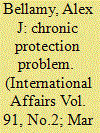

|
|
|
|
|
| Summary/Abstract |
The Democratic Peoples' Republic of Korea (DPRK) is arguably the world's most chronic abuser of human rights. In an unprecedented move, a Commission of Inquiry established by the UN's Human Rights Council accused the DPRK government of systematic violations of human rights amounting to crimes against humanity. In so doing, the Commission succeeded in putting human rights in the DPRK on the global agenda. Within months the UN's General Assembly and Security Council had joined the human rights body in examining the issue. This article explains the emergence of this new engagement with human rights in the DPRK, showing its relation to the ‘Responsibility to Protect’ principle. It charts the growing sense of frustration felt at the lack of progress on human rights in DPRK and shows how this was manifested in the General Assembly's decision to pursue the Commission's recommendations and call on the Security Council to take concrete steps. Despite this, however, the article shows that there are powerful obstacles in the way of a more robust international approach to human rights in the DPRK and counsels a less confrontational approach focused on engaging China and building trust within the Security Council.
|
|
|
|
|
|
|
|
|
|
|
|
|
|
|
|
| 2 |
ID:
064922
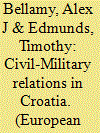

|
|
|
| 3 |
ID:
081547
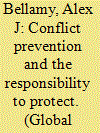

|
|
|
|
|
| Publication |
2008.
|
| Summary/Abstract |
Although the International Commission on Intervention and State Sovereignty identified the responsibility to prevent as the single most important aspect of its report The Responsibility to Protect, most scholarly and political attention has been given to the concept's reaction component rather than to its prevention component. This article aims to correct this imbalance by examining progress with, changes to, and attitudes toward the responsibility to prevent since the publication of the commission's report in 2001. It seeks to explain the relative neglect of prevention in debates about The Responsibility to Protect, arguing that the answer can be found in a combination of doubts about how wide the definition of prevention should be, political concerns raised by the use of prevention in the war on terrorism, and practical concerns about the appropriate institutional locus for responsibility. The article moves on to identify some basic principles that might help advance the responsibility to prevent
|
|
|
|
|
|
|
|
|
|
|
|
|
|
|
|
| 4 |
ID:
145681
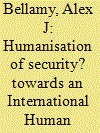

|
|
|
|
|
| Summary/Abstract |
Over the past few decades, genocidal killing and other mass atrocities have become less frequent and less lethal. At the same time, collective international responses have become more common and more comprehensive. What explains these two phenomena, and are they connected? This article suggests that the evidence of declining mass violence and growing international activism is not only compelling but that the two phenomena are connected by the emergence of a new international human protection regime. The article proceeds in three parts. The first examines the evidence for thinking that the world is experiencing both a decline in mass violence and an increase in international activism in response to such violence. The second outlines the emergence, scope, and limits of the human protection regime. The third considers whether the regime itself is associated with the changing practices of third parties to mass violence. The fourth part contrasts this explanation with potential alternatives.
|
|
|
|
|
|
|
|
|
|
|
|
|
|
|
|
| 5 |
ID:
066628
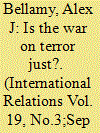

|
|
|
| 6 |
ID:
074304


|
|
|
|
|
| Publication |
Cambridge, Polity, 2006.
|
| Description |
xi, 280p.
|
| Standard Number |
0745632823
|
|
|
|
|
|
|
|
|
|
|
|
Copies: C:1/I:0,R:0,Q:0
Circulation
| Accession# | Call# | Current Location | Status | Policy | Location |
| 051812 | 172.42/BEL 051812 | Main | On Shelf | General | |
|
|
|
|
| 7 |
ID:
103674
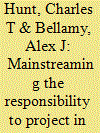

|
|
|
| 8 |
ID:
105714
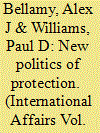

|
|
|
|
|
| Publication |
2011.
|
| Summary/Abstract |
In March 2011, the UN Security Council authorized the use of force to protect civilians in Libya. This was the first time that the Council has ever authorized the invasion of a functioning state for such purposes. International society's relatively decisive responses to recent crises in Côte d'Ivoire and Libya has provoked significant commentary, suggesting that something has changed about the way the world responds to violence against civilians. Focusing on these two cases, this article examines the changing practice of the UN Security Council. It argues that we are seeing the emergence of a new politics of protection, but that this new politics has been developing over the past decade. Four things are new about this politics of protection: protecting civilians from harm has become a focus for international engagement; the UN Security Council has proved itself willing to authorize the use of force for protection purposes; regional organizations have begun to play the role of 'gatekeeper'; and major powers have exhibited a determination to work through the Security Council where possible. However, the cases of Côte d'Ivoire and Libya also help to highlight some key challenges that might halt or reverse progress. Notably, states differ in the way they interpret mandates; questions are being asked about the UN's authority to act independently of specific Security Council authorizations; the overlap of regional organizations sometimes sends conflicting messages to the Security Council; and there remains a range of difficult operational questions about how to implement protection mandates. With these in mind, this article concludes with some suggestions about how the future challenges might be navigated in order to maintain the progress that has been made in the past decade.
|
|
|
|
|
|
|
|
|
|
|
|
|
|
|
|
| 9 |
ID:
021830


|
|
|
|
|
| Publication |
Spring 2002.
|
| Description |
117-144
|
|
|
|
|
|
|
|
|
|
|
|
|
|
|
|
| 10 |
ID:
068635


|
|
|
| 11 |
ID:
117057
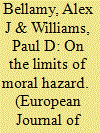

|
|
|
|
|
| Publication |
2012.
|
| Summary/Abstract |
Advocates of moral hazard theory argue that the 'responsibility to protect' causes genocidal violence that would not otherwise occur. After summarizing the main elements of the moral hazard approach, this article demonstrates that there is no empirical evidence to support the general claim that the 'responsibility to protect' is a remote cause of genocide. This is followed by an analysis of the conflicts in Bosnia, Kosovo and Darfur which demonstrates that moral hazard does not provide a plausible account of the proximate causes of genocidal violence in these cases. We suggest that a major part of the explanation for why moral hazard theory performs so badly is its reductionist account of the dynamics of armed conflict and its simplistic understanding of the dynamics of provocation.
|
|
|
|
|
|
|
|
|
|
|
|
|
|
|
|
| 12 |
ID:
021778


|
|
|
|
|
| Publication |
Spring 2002.
|
| Description |
1-26
|
|
|
|
|
|
|
|
|
|
|
|
|
|
|
|
| 13 |
ID:
127858
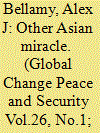

|
|
|
|
|
| Publication |
2014.
|
| Summary/Abstract |
East Asia has a long history of genocide and mass atrocities. For much of the Cold War, East Asia was one of the world's most violent regions, experiencing multiple outbursts of mass killing. Since the end of the Cold War, however, the region has been transformed thanks to another Asian miracle. There are now fewer cases of genocide and mass atrocities in East Asia today than at any point in history for which we have reliable records. This article demonstrates and then tries to account for the dramatic decline of mass atrocities in East Asia. It argues that the decline was enabled by a combination of three major structural changes: reduction in the selection of mass atrocities as a weapon of war, increase in incomes, and progress towards democratization combined with the emergence of new ideas about sovereignty and their accommodation with existing principles of non-interference. Together, these structural and ideational changes created a changed regional context of increased costs and reduced payoffs for the commission of mass atrocities.
|
|
|
|
|
|
|
|
|
|
|
|
|
|
|
|
| 14 |
ID:
114218
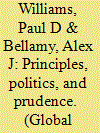

|
|
|
| 15 |
ID:
087992


|
|
|
|
|
| Publication |
2009.
|
| Summary/Abstract |
Written prior to the release of the UN Secretary-General's report on implementing the Responsibility to Protect (R2P), this article examines the effort to translate the principle from words into deeds. It begins by noting a post-2005 "revolt" against the principle in which a number of states expressed skepticism about the principle and its use in different settings. This revolt, the article contends, was largely a product of the continuing association between R2P and humanitarian intervention. This association was, in turn, caused by a combination of misplaced commentary and the International Commission on Intervention and State Sovereignty's focus on the intervention question. This article maintains that building consensus on the R2P requires a shift in emphasis and proposes three avenues: clarifying the nature of prevention, developing practical measures, and proposing modest proposals for institutional reform.
|
|
|
|
|
|
|
|
|
|
|
|
|
|
|
|
| 16 |
ID:
123260


|
|
|
|
|
| Publication |
2013.
|
| Summary/Abstract |
This article argues that the Responsibility to Protect (RtoP) adds value to international efforts to protect populations from genocide and mass atrocities, but not in the ways commonly thought. It suggests that RtoP is not particularly effective as a 'rallying call' that mobilises action in cases where international society may be initially reluctant to act. Where it does add value is in helping to reshape states' identities and interests such that consideration of the protection needs of populations, in relation to the threat of genocide and mass atrocities, has been internalised to some extent by the UN Security Council. As such, RtoP is best seen as being a 'habit former'. The principle does not, however, determine particular behaviours or guarantee international consensus because decision-making is heavily influenced by contextual factors. The argument proceeds in three parts. The first examines instances where RtoP has been invoked since early 2006. The second explores the role of context in shaping how the UN Security Council responds to particular crises. Finally, to amplify the points made in these sections, the third section considers the UN Security Council's response to the crisis in Somalia after 2006.
|
|
|
|
|
|
|
|
|
|
|
|
|
|
|
|
| 17 |
ID:
098169


|
|
|
|
|
| Publication |
2010.
|
| Summary/Abstract |
It is widely recognised that the Responsibility to Protect (RtoP), adopted by heads of state and government in 2005, is an important new international principle. Australia has been one of the principle's most significant contributors, with prominent Australians and governments from both sides of politics contributing to its development, emergence, and implementation. This article traces and explains Australia's contribution to RtoP and asks what more it might do to assist in its implementation. It argues that Australia's commitment to RtoP is informed by a synergy of values and interests and has been strengthened by the Rudd government's reengagement with multilateralism. It concludes by calling for the development of a whole-of-government strategy for implementation and by suggesting some policy avenues that might be considered.
|
|
|
|
|
|
|
|
|
|
|
|
|
|
|
|
| 18 |
ID:
106017


|
|
|
|
|
| Publication |
2011.
|
| Summary/Abstract |
The responsibility to protect (R2P) comprises each state's responsibility to protect its own populations from genocide, war crimes, ethnic cleansing and crimes against humanity, the international community's duty to assist states in this endeavour, and a responsibility for the international community to take timely and decisive action in situations where the host state has manifestly failed. At first glance, the latter two elements of this principle seem to require behaviour that contradicts the principle of non-interference. This raises questions as to why R2P was endorsed by Southeast Asian governments and whether it can be localised in a region whose politics are underpinned by non-interference. This article argues that processes of norm localisation are producing an accommodation between the two principles. This accommodation involves the formal retention of both principles but the subtle realignment of each in order to make them compatible and make support for both coherent. It is this third explanation, we argue, that best explains the relationship between R2P and non-interference in Southeast Asia: R2P has been revised to limit its capacity to legitimise coercive interference, whilst non-interference is in the process of being recalibrated to permit expressions of concern, offers of assistance and even the application of limited diplomatic pressure in response to major humanitarian crises. Thus, whilst the region remains largely hostile to doctrinal revisions to non-interference, subtle changes are evident in practice. This article outlines the evolution of R2P as a challenge to traditional notions of state sovereignty, provides an overview of non-interference and past efforts to revise the principle, and examines two case studies to understand how the two principles are being accommodated in practice.
|
|
|
|
|
|
|
|
|
|
|
|
|
|
|
|
| 19 |
ID:
093775
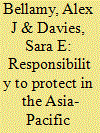

|
|
|
|
|
| Publication |
2009.
|
| Summary/Abstract |
In 2005, governments around the world unanimously agreed to the principle of the responsibility to protect (R2P), which holds that all states have a responsibility to protect their populations from genocide and mass atrocities, that the international community should assist them to fulfil this duty, and that the international community should take timely and decisive measures to protect populations from such crimes when their host state fails to do so. Progressing R2P from words to deeds requires international consensus about the principle's meaning and scope. To achieve a global consensus on this, we need to better understand the position of governments around the world, including in the Asia-Pacific region, which has long been associated with an enduring commitment to a traditional concept of sovereignty. The present article contributes to such an endeavour through its three sections. The first part charts the nature of the international consensus on R2P and examines the UN secretary-general's approach. The second looks in detail at the positions of the Asia-Pacific region's governments on the R2P principle. The final part explores the way forward for progressing the R2P principle in the Asia-Pacific region.
|
|
|
|
|
|
|
|
|
|
|
|
|
|
|
|
| 20 |
ID:
080199


|
|
|
|
|
| Publication |
London, Routledge, 2008.
|
| Description |
vi, 218p.
|
| Series |
Routledge security in Asia Pacific series; no. 6
|
| Standard Number |
9780415416191
|
|
|
|
|
|
|
|
|
|
|
|
Copies: C:1/I:0,R:0,Q:0
Circulation
| Accession# | Call# | Current Location | Status | Policy | Location |
| 053011 | 355.033059/BEE 053011 | Main | On Shelf | General | |
|
|
|
|
|
|
|
|
|